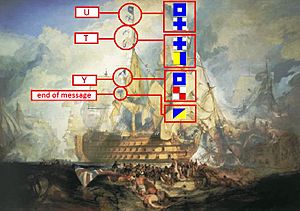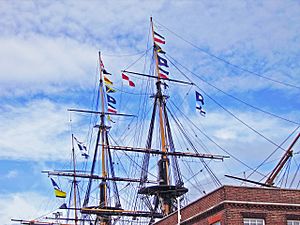England expects that every man will do his duty facts for kids

"England expects that every man will do his duty" is a very famous signal. It was sent by Vice-Admiral Horatio Nelson, 1st Viscount Nelson from his main ship, HMS Victory, just before the Battle of Trafalgar started on October 21, 1805.
During the battle, as Nelson's ships got closer to the enemy fleet, he told Lieutenant John Pasco to send a message to the British fleet quickly. Pasco suggested a small change, and Nelson agreed. The signal was sent around 11:45 a.m. on October 21, 1805. It was sent using a special flag code called the "Telegraphic Signals of Marine Vocabulary."
Even though people were a bit confused about the exact words of the signal after the battle, the British victory and Nelson's death made the phrase very important. It became a symbol of English courage and virtue when facing challenges. People still quote, change, and refer to this phrase today.
Contents
Why the Signal Was Sent
Napoleon's Invasion Plans
During the Napoleonic Wars, a powerful French leader named Napoleon wanted to invade Britain. To do this, he needed his French navy and the Spanish navy to control the English Channel. This would allow his large army, called the Grande Armée, to cross safely.
The Battle of Trafalgar
The combined French and Spanish navies, led by Admiral Pierre-Charles Villeneuve, sailed towards Cape Trafalgar. There, they met a British fleet led by Admiral Horatio Nelson. On October 21, 1805, the Battle of Trafalgar began. Nelson had 27 ships, while the French and Spanish had 33.
Nelson sailed his fleet right into the middle of the enemy ships to break their formation. The battle was a huge victory for Britain. The French and Spanish lost 22 ships, but the British lost none. About 14,000 French soldiers were lost, with 7,000 becoming prisoners. Around 1,500 British sailors died, including Admiral Nelson himself. This victory meant Britain controlled the seas and Napoleon could not invade.
Sending Nelson's Famous Signal
Choosing the Right Words
As the British fleet got closer to the French and Spanish ships, Nelson sent important battle instructions. He felt something more was needed. He told his signal officer, Lieutenant John Pasco, to send a message quickly. Nelson wanted to say: "England confides that every man will do his duty."
Pasco suggested a change. He said that "expects" was in the signal book, but "confides" would have to be spelled out letter by letter. Nelson agreed to use "expects" to save time, even though it changed the meaning slightly.
The Signal is Hoisted
So, around 11:45 a.m. on October 21, 1805, the signal was sent. The exact time is not known for sure, but Pasco said it was "about a quarter to noon." Logs from other ships also show it was around this time.
The signal used a special flag code called the "Telegraphic Signals of Marine Vocabulary." This code was created in 1800 by Rear Admiral Sir Home Popham. It used ten signal flags, each representing a digit from 0 to 9. These flags were combined to make code numbers for letters and words.
The flags were likely raised on the mizzenmast (the back mast of the ship), one after another. A special "telegraphic flag" (red over white) was also flown to show that Popham's code was being used. The code also had "repeat" flags, so you didn't need multiple flags for the same digit. For example, the word do (code 220) used a "2" flag, a "first repeat" flag for the second "2", and a "0" flag.
The word duty was not in the codebook, so it had to be spelled out. The whole message needed twelve "lifts" (times the flags were raised). It probably took about four minutes to send. A team of four to six men, led by Lt. Pasco, prepared and raised the flags on Nelson's ship, HMS Victory. When the signal was raised, a great cheer went up from all the ships in the fleet.
Collingwood's Reaction
The historian John Knox Laughton wrote that when Collingwood saw the flags going up, he joked to his officer, "I wish Nelson would make no more signals; we all understand what we have to do." But when he heard what the signal said, he was very happy and told his crew, who cheered loudly.
Nelson's Final Order
Nelson's last signal to the fleet was "engage the enemy more closely." This was sent at 12:15 p.m., before any British cannons had fired. Nelson ordered this signal to be kept flying. It stayed up until it was shot away during the battle.
The Signal After the Battle
How the Signal Was Misquoted
Right after the battle, people started quoting the signal incorrectly. Many ships recorded it as "England expects every man to do his duty" (missing "that" and changing "will" to "to"). This version became so common that it's even written on Nelson's tomb in St Paul's Cathedral and around the base of Nelson's Column.
However, the logbook of the Victory and the reports from signal officer John Pasco and Captain Henry Blackwood (who were there when the signal was prepared) all agree on the original wording. In 1805, The Times newspaper reported it as "England expects every officer and man to do his duty this day."
In 1811, a singer named John Braham wrote a song called "The Death of Nelson." To make the words fit the music, they were changed to "England expects that every man this day will do his duty." This version also became very popular.
Flag Code Confusion
Between 1885 and 1908, people thought the signal had been sent using an older flag code book from 1799. But in 1908, it was found that the British Navy had actually changed the code in 1803. New code books were given to Nelson's fleet in September 1805. So, books published during those years showed the signal with the wrong flags.
Today, the signal is still raised on the Victory at her dry dock in Portsmouth every year on Trafalgar Day (October 21). The flags are displayed all at once, from front to back, instead of one by one.
Other navies around the world have copied this famous signal:
- Napoleon ordered the French version, "La France compte que chacun fera son devoir" (France expects that everyone will do their duty), to be flown on French ships.
- In 1814, during the Battle of Plattsburgh, American Commodore Thomas MacDonough flew the signal "Impressed seamen call on every man to do his duty." This referred to the forced recruitment of sailors, which was a reason for the War of 1812.
- In 1865, during the Battle of Riachuelo, Brazilian Admiral Manuel Barroso rallied his fleet with the Portuguese version, "O Brasil espera que cada um cumpra o seu dever" (Brazil expects that every man fulfill his duty).
- A similar signal was used by the Imperial Japanese Navy in 1905 during the Russo-Japanese War. Admiral Tōgō Heihachirō, who was called the "Nelson of the East," signaled: "The fate of the Empire depends upon today's battle: let every man do his utmost."
How the Phrase is Used Today
In Books and Literature
The phrase has appeared in many famous books:
- Charles Dickens quoted it in his novel Martin Chuzzlewit.
- In Lewis Carroll's The Hunting of the Snark, the Bellman says: "For England Expects – I forbear to proceed. Tis a maxim tremendous, but trite."
- Ogden Nash wrote a short poem called "England Expects" in his 1938 collection.
- James Joyce adapted it in his novel, Ulysses, saying "Ireland expects that every man this day will do his duty."
In Modern Times
During World War II, a British Navy poster encouraged people to work harder at home. It said: "Britain expects that you too, this day, will do your duty." Nelson's flag signal was also raised by the Royal Navy ship HMS Erebus at the start of the Normandy landings on June 6, 1944.
The phrase was also mentioned by Margaret Thatcher in a speech that helped her get support for the poll tax.
Today, "England expects..." is often used in the media, especially when talking about English sports teams and their hopes for victory. A book about the England national football team is even called England Expects. There's also a BBC Scotland television drama with the same name.
See also
- Z flag § Military uses
 | Dorothy Vaughan |
 | Charles Henry Turner |
 | Hildrus Poindexter |
 | Henry Cecil McBay |




